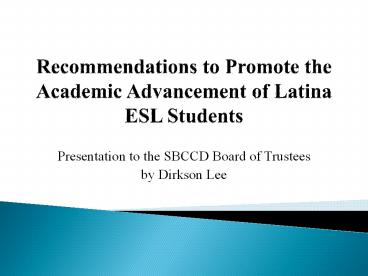Recommendations to Promote the Academic Advancement of Latina ESL Students
Title: Recommendations to Promote the Academic Advancement of Latina ESL Students
1
Recommendations to Promote the Academic
Advancement of Latina ESL Students
- Presentation to the SBCCD Board of Trustees
- by Dirkson Lee
2
Researchers Background
- Associate Professor, SBVC English Department
- Taught English composition and ESL at SBVC since
2001 - Writing Center Lead Instructor
3
Rationale for Study
- Goal of Student Success Initiative
- to increase the effectiveness of
- basic skills instruction.
- Promote the advancement of English
language learners - Improvement rates of ESL students at SBVC have
declined - (ARCC Report, 2012)
4
Population of Concern
- Latina English as a second language (ESL)
students.
5
Problem Statements
- Although Latinas are a growing population of ESL
students at SBVC, few have been documented to
reach transfer level readiness.
6
Purpose Statement
- To examine the experiences of academically
successful Latina ESL community college students
to understand how they prepare themselves
academically for college transfer level readiness
7
Research Questions
- What are the barriers and challenges that Latina
ESL students experience in community college? - What are the types of capitals that enable Latina
ESL students to address their barriers and
challenges? - How did the types of capitals that Latina ESL
students used affect their educational
trajectories, and more specifically, their
transition from ESL to transfer level readiness?
8
Theoretical Framework
- Yossos model of Community Cultural Wealth
- (Yosso, 2005)
9
Methodology
- Qualitative study
- In-depth interviews
- Analysis of participant narratives
10
Participants
- Identification of students by the colleges
Department of Research - Total of 10 participants
11
Findings and Recommendations
12
Barriers and Challenges
- Language barriers
- Students who complete ESL program exhibit ELL
characteristics long into their academic
pathways. - Expectations of linguistic homogeneity in
transfer level coursework
13
Recommendations
- Recognize the value of and invest in services,
such as tutoring, to meet the needs of ELLs at
all stages of their academic pathways. - Invest in courses and programs that foster
language development - E.g. Reading with ESL emphasis /
- noncredit courses
14
Recommendations
- Offer professional development workshops to help
faculty to be more attuned to the needs of ELLs,
in particular mainstream classes.
15
Barriers and Challenges
- Unfamiliarity with college system
- Disadvantages
- financial
- academic
16
Recommendations
- Advice for mandatory orientation policy Caution
using the following info delivery methods - Web-based orientation tools
- Text only documents
17
Resources and Capitals
- High levels of family support and involvement
- Parents
- Husbands
- Children
18
Recommendations
- Provide campus wide activities for students that
include family members, in particular spouses and
children. - Possible events/activities
- Motivational speakers
- Orientation of college and providing information
of key resources.
19
References
- Baca, M., Cabaldon, C., Carroll, C. M., Cooper,
T., Delahoussaye, Y., Duran, B.,Shulock, N.
(2012). Advancing student success in the
California Community Colleges Recommendations of
the California Community Colleges Student
Success Task Force. Student Success Task Force. - Baca, M., Baum, L. B., Berg, N., Bielanski, J.
J., Hawkinds, D. E., Himelstein, S.,Izumi, L.
T. (2012, March 31). Focus on results
Accountability reporting for the California
community colleges. California Community
Colleges Chancellors Office. - Collins, M. L. (2010, June 18). Overview of the
national landscape for developmental education
improvement Testimony before the Texas Senate
Higher Education Committee. Jobs for the Future. - Yosso, T. J. (2005). Whose culture has capital?
A critical race theory discussion of community
cultural wealth. Race Ethnicity and Education.
8(1), 69-91.
20
- Thank You!

